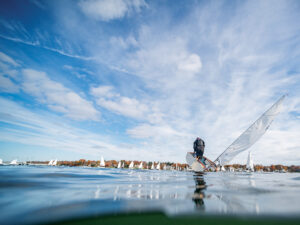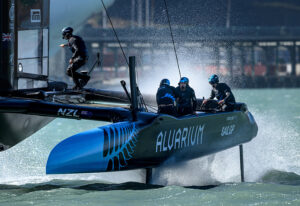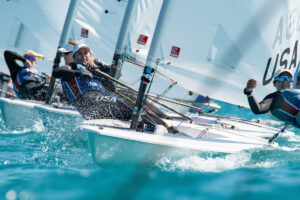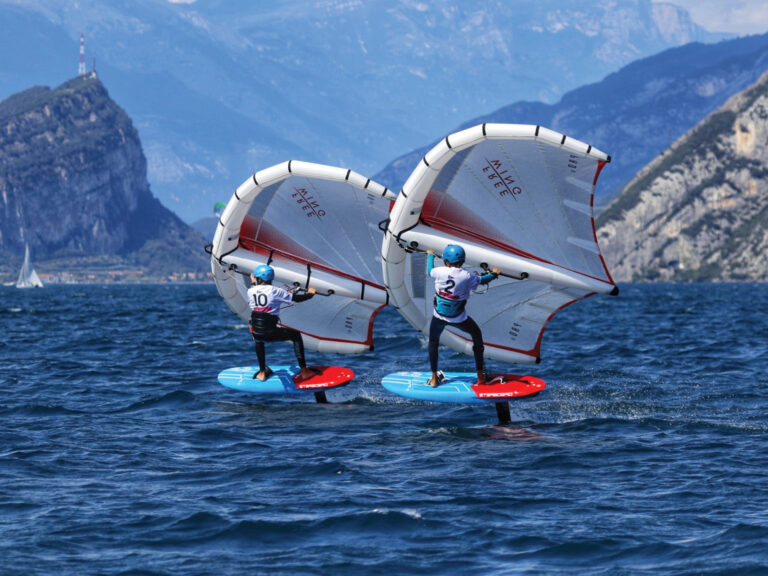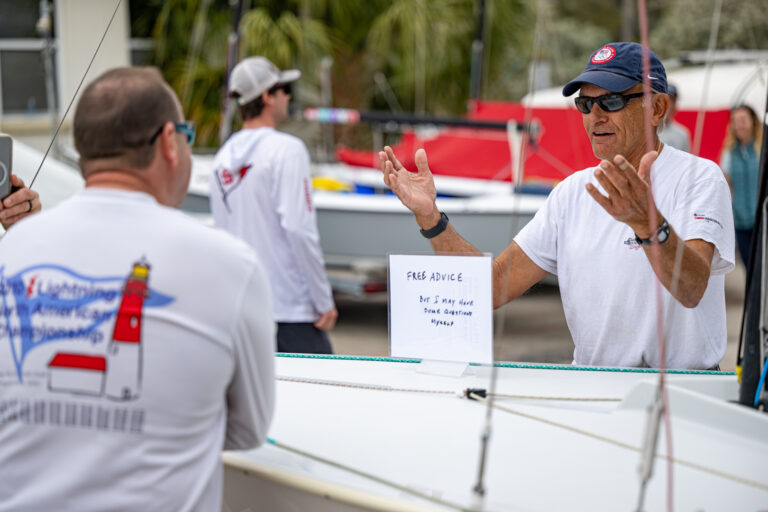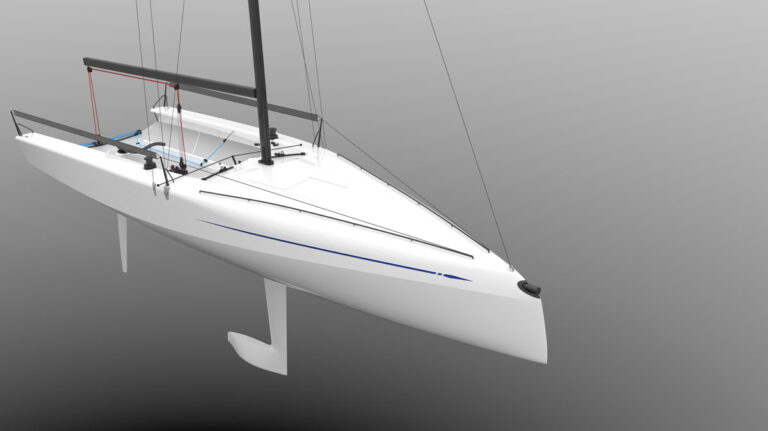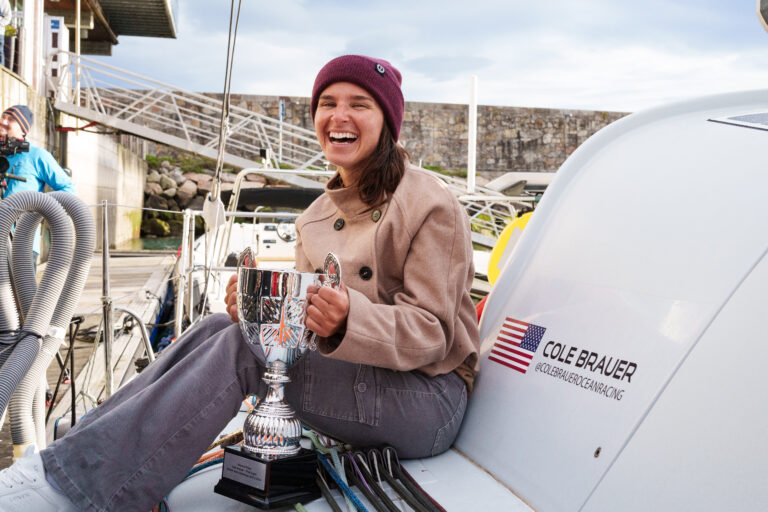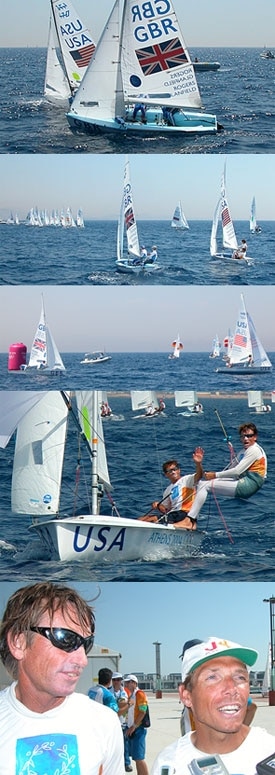
Olympic0821
ATHENS–Four years ago, Paul Foerster won a silver medal at the Sydney Olympics much the way he lives his life, quietly, without a lot of celebration or outward emotion. Today, at the 2004 Olympics, he won gold in a much different manner. The difference is due largely to Kevin Burnham, his crew for the past two years. Burnham, a 47-year-old with the energy and enthusiasm of a teenager, whooped and screamed as the duo approached the finish on a tight reach, and then unclipped from his trapeze wire as soon as they crossed the line and did a back flip, or at least 75 percent of one, into the Saronic Gulf. Such a exclamation isn’t Foerster’s style. But he basked it the glow of the win just the same, accepting congratulations from the fleet and then, after retrieving his crew, taking a quick victory lap through the small fleet assembled at the finish. Foerster has steadfastly maintained that an Olympic campaign is about the journey and not the reward. Today, though, he seemed especially happy with the fruits of all his hard work. And rightfully so. “This is my fourth Olympics,” said Foerster. “and I have two second places. You always think, ‘Well, we won the silver.’ But it’s kind of a letdown not winning the regatta, because you always want to win. It’s nice to not have a letdown after the last race. It feels great.” The U.S team entered the final race with a two-point margin over Nick Rogers and Joe Glanfield of Great Britain. More importantly, the U.S. duo had a lower throw out than the British team and would therefore win the gold if both teams had an awful race. The strategy was simple, get in front of the Brits and slow them down. A British result of 16th or worse ensured the U.S. of a gold in the 470. Of course, Rogers and Glanfield were well aware of what the Americans would try to do. Their strategy was to hover to leeward of the boat end of the line before the start and then sheet in and sail so they would reach the line with about 30 seconds to go. Then they’d find a hole in the pack and hopefully be able to shed the Americans as both teams tried to cross the line in heavy traffic. “I think that we realized with 2 minutes to start that it’d just all gone horribly wrong,” said Rogers. “We opted for a safe strategy before the start, so that we had lots of options and it’d be very difficult for Paul and Kevin to keep us out of the race. But that only works in 8 knots and the wind dropped and shifted slightly left and we couldn’t get to the starting line.” Foerster and Burnham quickly realized the opportunity the change in the breeze afford them and they quickly moved into a controlling position to windward of the British team. A furious tacking duel ensued, with each team making no fewer than eight tacks in the space of 30 seconds. Each team made four more tacks as the clock ticked to zero, and the rest of the fleet took off upwind, ensuring that the British, and the Americans, would be 15 seconds late crossing the line. Another tack duel erupted just across the line, but the U.S. team was able to match their rivals tack for tack. Halfway up the beat, the British team was finally able to see a glimmer of hope as they were able to get slightly out of sync with Foerster and Burnham. Realizing they were about to lose their advantage, the U.S. duo tacked onto starboard to leeward and bow out of the British team and turned on the jets, quickly reestablishing an advantage they wouldn’t relinquish for the rest of the contest. The only other slightly nervous moment–though both Foerster and Burnham said they were nervous until the final mark–was at the first leeward gate rounding. But the Americans played it perfectly. From ahead, they paced the Brits as both teams approached the right-hand gate (looking upwind). When the Americans finally had to commit, Rogers and Glanfield were able to break away and go for the left-hand gate, but the freedom came at too big a price as they had a long way to sail to get to the other gate. Foerster and Burnham were able to tack around the right-hand gate and quickly get back into a controlling position for the final beat. “It was totally unbelievable,” said Burnham, who added the gold to the silver he won in the class 12 years ago in Barcelona. “I don’t know what else to say. When I saw the finish line and the Brits behind us, and I knew they couldn’t win, I was just elated.” Three other classes closed out their Olympic regattas today. In two of the three, the U.S. did quite well in the final race. Kevin Hall’s seventh moved him up to 11th overall in the regatta. Hall, who’d declined to be interviewed by the media during the regatta. spoke at length after the conclusion of racing. Though he had a wonderful experience at his first Olympics, realizing a childhood dream he first had at the age of five, he said he was disappointed with how he sailed. He specifically said that though he had no troubles with the Therapeutic Use Exemption, he did have some problems getting the weekly injection of testosterone he requires since he lost both of his testicles to cancer over a decade ago. “I’m very grateful to be here, don’t get me wrong. I’m very grateful to be here,” he said. “But it was really hard and challenging to have the whole shot day thing happen not once but twice. We had a week to plan for the second time during the event and that didn’t go well either. I was hoping to bounce back, have a good second half, and I don’t have the skill or the strength or the Zen or whatever it is to handle that kind of thing yet.” Hall, who will jump right into the America’s Cup game as a navigator and on-water testing manager for Team New Zealand, where he’ll join fellow Finn Olympian Ben Ainslie and Dean Barker, said he will “lean out” a little bit, but will try to maintain a core level of fitness in anticipation of another campaign for the 2008 Olympics in Beijing. Katie McDowell and Isabelle Kinsolving scored a fourth in their final race and jumped up to fifth overall. It was a solid finish for the crew. But for one really awful day, a pair of 18s, they would’ve been in the medal hunt. The final race didn’t go as well for the Yngling team of Carol Cronin, Liz Filter, and Nancy Haberland. They were OCS and had to retire after rounding the top mark in second. They finished 10th overall. Two other classes had their first races today, and in a light sea breeze, the U.S. had an outstanding day. The Tornado team of John Lovell and Charlie Ogletree had a pair of seconds and are tied on points for first with the defending gold medalists, Roman Hagara and Hans Peter Steinacher of Austria. Paul Cayard and Phil Trinter won their first Olympic race and then crawled back from 15th place at the first windward mark to sixth in the second race. They are first by two points over Torben Grael and Marcelo Ferreira of Brazil. In the Mistral classes, Lanee Beashel had her best result of the regatta, a sixth. The Laser and Europe classes will finish up tomorrow. The U.S. has been eliminated from medal contention in both. Results of Interest Men’s Mistral (34 boards) Peter Wells (USA): (22, 20, 23, 16, 22, (29), 28, 24) 24th Women’s Mistral (26 boards) Karla Barrera (PUR): ((26), 24, 25, 26, 23, 25, 26, 26) 26th Lanee Beashel (USA): (13, 16, 9, (18), 17, 14, 6, 14) tied on points for 16th Finn (25 boats) Regatta Finished Richard Clarke (CAN): (10, 18, 15, 22, 19, 15, (OCS), 14, 8, 11, 2) 18th Ben Ainslie (GBR): (9, (DSQ), 1, 1, 4, 1, 2, 3, 2, 1, 14) first Dean Barker (NZL): (5, 10, 7, 11, 7, 16, (OCS), 12, 19, 20, 10) 13th Kevin Hall (USA): (11, 6, 13, (17), 16, 14, 13, 9, 9, 17, 7) 11th Europe (25 boats) Meg Gaillard (USA): (9, 11, 13, 9, 3, 13, 11 (16), 10) 11th Laser (42 boats) Robert Scheidt (BRA): (3, (8), 1, 3, 8, 4, (19), 12, 7, 3) first Bernard Luttmer (CAN): (15, 25, 22, 21, 27, 33, 31, (DNF), 9, 33) 28th Timothy Pitts (ISV): ((42), 40, 41, 40, 36, 39, 37, 34, 35, 42) 41st Hamish Pepper (NZL): (24, 9, 26, 11, 9, 5, 13, 3, (DNF), 2) tied on points for ninth Mark Mendelblatt (USA): (2, 14, 20, 6, 6, 10, (29), 22, 16. 6) tied on points for ninth Men’s 470 (27 boats) Regatta Finished Paul Foerster/Kevin Burnham (USA): (1, 8, 2, 15, 9, 4, 3, 7, 18, 4, (23)) first Women’s 470 (20 boats) Regatta Finished Jen Provan/Nikola Girke (CAN): (4, 13, 17, 11, 12, 7, 2, (19), 6, 19, 12) 13th Katie McDowell/Isabelle Kinsolving (USA): (12, 16, 3, 12, 9, 2, (18), 17, 8, 1, 4, ) fifth 49er (19 boats) Tim Wadlow/Pete Spaulding (USA): (7, 8, 5, (OCS), 9, 9, 8, 3, 1) third Tornado (17 boats) Oskar Johansson/John Curtis (CAN): (14, 15) 15th Enrique Figueroa/Jorge Hernandez (PUR): (5, 9) tied on points for fifth John Lovell/Charlie Ogletree (USA): (2, 2) tied on points for first Star (17 boats) Peter Bromby/Lee White (BER): (17, 16) 17th Torben Grael/Marcelo Ferreira (BRA): (5, 4) second Ross MacDonald/Mike Wolfs (CAN): (7, 11) 11th Paul Cayard/Phil Trinter (USA): (1, 6) first Yngling (16 boats) Regatta Finished Paula Lewin/Peta Lewin/Christine Patton (BER): (4, 15, 6, 13, (16), 14, 9, 16, 16, 11, 4) 15th Lisa Ross/Chantal Leger/Deirdre Crampton (CAN): (13, 9, (15), 15, 12, 12, 12, 14, 15, 2, 12) 16th Carol Cronin/Liz Filter/Nancy Haberland (USA): (2, 10, 16, 9, 15, 10, 1, 15, 7, 1, (OCS)) 10th

